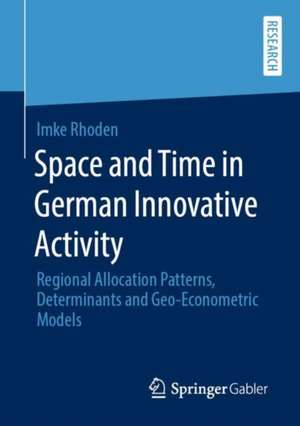Space and Time in German Innovative Activity: Regional Allocation Patterns, Determinants and Geo-Econometric Models
Autor Imke Rhodenen Limba Engleză Paperback – 27 noi 2019
Three analyses show regional and temporal behavior and determinants of innovation activity in Germany in the timeframe 2000-2016. Techniques as kernel density estimation and geoadditive modeling allow gaining insights into the allocation of innovation economics. On the geographical level of administrative districts innovation and its theory-based determining factors are connected. Estimation methods also add to the explanatory content of the models, partly assisted by the usage of Bayesian prior knowledge. The results allow explicit economic and political consequences and offer possibilities for detailed support of innovation and economic growth. The reflection of the estimated effects back onto regions can increase understanding of the spatial characteristics of innovation.
Imke Rhoden is research assistant at the chair of Economic Policy 3 at the Ruhr-Universität Bochum. Their scientific focus is directed at spatial modeling of innovation and economic growth and applications for economic policy.
Preț: 382.95 lei
Nou
Puncte Express: 574
Preț estimativ în valută:
73.30€ • 77.01$ • 61.60£
73.30€ • 77.01$ • 61.60£
Carte tipărită la comandă
Livrare economică 11-25 martie
Preluare comenzi: 021 569.72.76
Specificații
ISBN-13: 9783658285999
ISBN-10: 3658285990
Pagini: 224
Ilustrații: XVI, 224 p. 41 illus., 11 illus. in color.
Dimensiuni: 148 x 210 mm
Greutate: 0.3 kg
Ediția:1st ed. 2019
Editura: Springer Fachmedien Wiesbaden
Colecția Springer Gabler
Locul publicării:Wiesbaden, Germany
ISBN-10: 3658285990
Pagini: 224
Ilustrații: XVI, 224 p. 41 illus., 11 illus. in color.
Dimensiuni: 148 x 210 mm
Greutate: 0.3 kg
Ediția:1st ed. 2019
Editura: Springer Fachmedien Wiesbaden
Colecția Springer Gabler
Locul publicării:Wiesbaden, Germany
Cuprins
Regional Allocations of Innovative Activity.- The Case of 3D Printing.- Regional Determinants of Innovative Activity.- Geoadditive Modeling of Diverging Allocations.- Innovative Activity over Space and Time.- Spatiotemporal Modeling of Innovation Promoting Factors.
Notă biografică
Imke Rhoden is research assistant at the chair of Economic Policy 3 at the Ruhr-Universität Bochum. Their scientific focus is directed at spatial modeling of innovation and economic growth and applications for economic policy.
Textul de pe ultima copertă
Three analyses show regional and temporal behavior and determinants of innovation activity in Germany in the timeframe 2000-2016. Techniques as kernel density estimation and geoadditive modeling allow gaining insights into the allocation of innovation economics. On the geographical level of administrative districts innovation and its theory-based determining factors are connected. Estimation methods also add to the explanatory content of the models, partly assisted by the usage of Bayesian prior knowledge. The results allow explicit economic and political consequences and offer possibilities for detailed support of innovation and economic growth. The reflection of the estimated effects back onto regions can increase understanding of the spatial characteristics of innovation.
Contents
- Regional Allocations of Innovative Activity – The Case of 3D Printing
- Regional Determinants of Innovative Activity – Geoadditive Modeling of Diverging Allocations
- Innovative Activity over Space and Time – Spatiotemporal Modeling of Innovation Promoting Factors
Target Groups
- Scientists and students of economic policy, regional economics, economic development, and econometrics
- Practitioners in the same fields
The Author
Imke Rhoden is research assistant at the chair of Economic Policy 3 at the Ruhr-Universität Bochum. Their scientific focus is directed at spatial modeling of innovation and economic growth and applications for economic policy.
Caracteristici
Small-scale economic modeling for explicit policy conclusions
